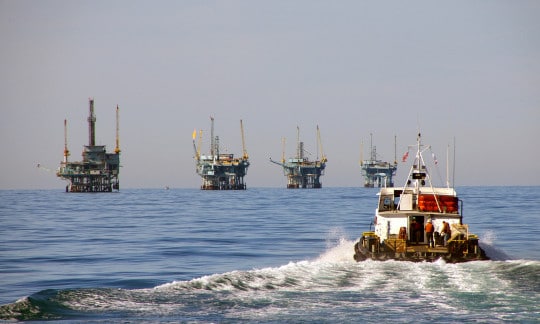House to Vote on Banning Offshore Drilling in Almost All US Waters

WASHINGTON – The House will vote next week on a trio of bills that would effectively block all new offshore oil and gas drilling in the waters around the United States.
In a letter to House members, Democratic House Leader Steny Hoyer said “while much of our work remains bottled up in the Republican-led Senate … it is important that our constituents know that we are continuing to fight for the people.”
Toward that end, Hoyer said the drilling ban bills, both of which have significant bipartisan support “will help protect our environment and the economies of coastal communities that rely on tourism, outdoor recreation, and fishing.”
The vote is currently expected to be held on Sept. 11.
H.R. 205, the Protecting and Securing Florida’s Coastline Act of 2019, introduced by Rep. Francis Rooney, R-Fla., would permanently extend the moratorium on offshore oil and gas exploration in the eastern Gulf of Mexico off Florida.
H.R. 1941, the Coastal and Marine Economies Protection Act, sponsored by Rep. Joe Cunningham, D-S.C., would prevent the Secretary of the Interior from including any drilling off the Pacific or Atlantic coasts in its offshore oil and gas leasing plan.
A third bill, H.R. 1146, the Arctic Cultural and Coastal Plain Protection Act, introduced by Rep. Jared Huffman, D-Calif., would prohibit drilling on the Arctic National Wildlife Refuge’s coastal plain.
The House Natural Resources Committee advanced all of the bills in June. Earlier this year the House included a year-long moratorium on drilling activities in these areas in the Interior Department’s FY2020 budget.
In a blog post, Alexandra Adams, legislative director of the nature program at the Natural Resources Defense Council, said “governors up and down our coasts, and Republicans and Democrats alike, have told the administration that we don’t want to risk our oceans, coastal economies and communities to the dangers of drilling. Communities and citizens from every coast have weighed in.
“These bills will protect those oceans—and the communities, economies, and ecosystems they support—from risky drilling,” Adams said. “The majority of Americans and hundreds of coastal communities, and countless businesses have all voiced their strong opposition to drilling off of their coasts, and these bills directly address those concerns permanently.”
Meanwhile, in an email blast to supporters, Brooke Still, director of digital strategy at the League of Conservation Voters, described H.R. 205 and H.R. 1941 as “must-pass bills to protect our coasts.”
“Together, these are the most significant federal votes against offshore drilling and seismic testing in decades,” she said.























